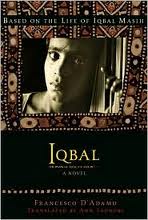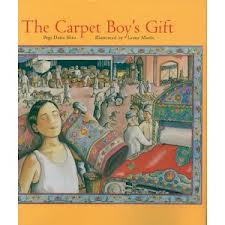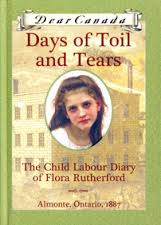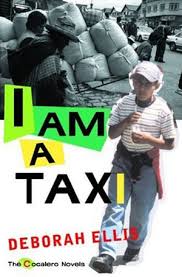Iqbal by Francesco D'AdamoThrough the eyes of Iqbal’s fictional co-worker (Fatima), D’Adamo retells the true story of Iqbal Masih. Iqbal, a 13-year-old boy from Pakistan, is originally sold into servitude. This story takes place in a carpet factory where children work all day in hopes of paying off family debt. When Iqbal arrives, he quickly points out to the others that no matter how much they work, their debt will never be paid off. Iqbal is determined to raise the spirit of the children by teaching them to believe eventually they will be free. One day Iqbal escapes and makes contact with the Bonded Labour Liberation Front. With the help of the BLLF and together with his co-workers, Iqbal exposes the corruption within the country and works to free other children sold into servitude.
Highly recommended for a novel study. |
The Carpet Boy's Gift by Peqi Deitz SheaLeadership comes easily for Nadeem, the biggest and oldest boy in a rug factory in Pakistan. But how can he lead the other child laborers to freedom after he’s been shamed and beaten for his first attempt?
Nadeem and his fellow workers are bonded laborers, children who work day and night to pay off loans their families have accepted from a factory owner. While Nadeem and his cousin Amina take pride in helping their poor families, they feel trapped. They yearn to go to school and to have time to play. One day a former carpet boy named Iqbal Masih leads a parade in the village. New laws have abolished bonded labor! Iqbal urges Nadeem to fight for freedom and to lead the children to a new school in town. Can Nadeem summon the courage to try again? This fictional story honors the legacy of Iqbal Masih, a real boy who had escaped from a factory. Protected and educated, he worked to liberate child workers like Nadeem by the thousands. His work won him the ReebokYouth in Action award and special recognition at the International Labor Conference. When he returned to Pakistan after his trip, he was fatally shot while riding his bicycle. He was only twelve, but he had already made a difference in children’s lives all over the world. Resources at the end of the story lead to more information about child labor issues and encourage children to support companies that work to make the world a better place for all. |
Days of Toil and Tears by Sarah EllisYoung Flora is happy to leave the orphanage behind and join her aunt and uncle, even though it means working at a textile mill where there is the constant threat of being injured or going deaf. She writes about her feelings in her diary, addressing her father and mother who died when she was five. Then her uncle loses several fingers at the weaving machine leaving him unable to work, and money is very tight. Can Flora help her aunt and uncle survive?
Days of Toil and Tears shows the hardships of life for poor children in the 1800’s, who often had to give up their childhood and work gruelling jobs so their families could survive. This is a good book to give to a preteen who enjoys historical fiction. |
I Am a Taxi by Deborah EllisI am a Taxi is set in Bolivia and is a novel highlighting the strains that the cocaine production and trade and the US “War on Drugs” has placed on the Bolivians. For 12-year-old Diego and his family, home is the San Sebastian Women’s Prison in Cochabamba, Bolivia. His parents farmed coca, a traditions Bolivian medicinal plant, until they got caught up in the middle of the government’s war on drugs. Diego’s adjusted to his new life. His parents are locked up, but he can come and go: to school, to the market to sell his mother’s hand-knitted goods, and to work as a “taxi”, running errands for other prisoners. But then his little sister runs away, earning his mother a heavy fine. The debt and dawning realization of his hopeless situations make him vulnerable to his friend Mando’s plan to make big money, fast. Soon, Diego is deep in the jungle, working as a virtual slave in an illegal cocaine operation. As his situation becomes more and more dangerous, he knows he must take a terrible risk if he ever wants to see his family again.
|




